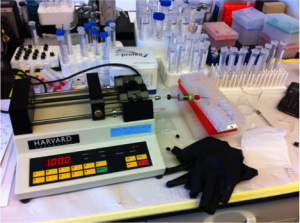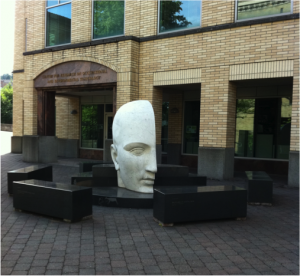 Now for a slight change of pace. After rehearsing my musical, I switched to a more left-brain-oriented project for the second two weeks of my winter break and worked in a biochemistry lab at the Oregon Health Sciences University where I had worked for the past three summers.
Now for a slight change of pace. After rehearsing my musical, I switched to a more left-brain-oriented project for the second two weeks of my winter break and worked in a biochemistry lab at the Oregon Health Sciences University where I had worked for the past three summers.
I was extremely lucky to have had the chance to spend the last three summers working in this lab after taking a neurology course at the Oregon Health Sciences University that introduces students to scientific research. I work with Dr. Larry David in the biochemistry department. He uses mass spectrometry, a really powerful tool of chemical analysis, to study how cataracts form, and he is really an expert in both mass spectrometry and lens research. I had the opportunity to learn some very interesting and useful chemistry techniques in the lab.
This winter break I came back to do some extra work in the lab. The cataract project that I am working on is still in progress, and we did some work on that project. I also spent some time prepping samples for another cataract project. I also got to do a little bit of data analysis as well.
Two weeks is really no time at all for science research, and I wish that I could have stayed for at least a month to make some more progress, but school was starting in just a few days.
Before I sign off, I’d also like to share this picture from OHSU:
The mysterious OSHU sculpture goes by many names, but the most popular is, “the half-head.”
If I’m interpreting this sculpture right, however, it is a sculpture of the right brain. Although I said earlier that working in the lab was a fairly left-brain-dominant activity, a lot of what scientists do requires extensive amounts of creativity. Sure, making solutions and running routine experiments is fairly logical, but solving problems that arise in the lab and contributing new techniques all require creativity. Moreover, I doubt that it’s mere coincidence that problem solving and the development of novel techniques are what lead to the biggest breakthroughs in science and health. As Albert Einstein said, “Imagination is more important than knowledge.”
During the weekend I switched gears and returned to the process of rehearsing an original musical. However, it really wasn’t so different from science. Both require a lot of patience, attention to detail and, of course, creativity.

